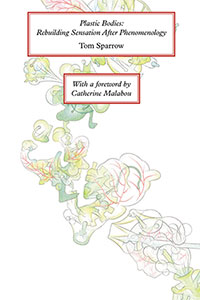Plastic Bodies: Rebuilding Sensation After Phenomenology
by Tom Sparrow
Foreword by Catherine Malabou

- New Metaphysics
- Published: 2015
- ISBN: 978-1-78542-001-6
Sensation is a concept with a conflicted philosophical history. It has found as many allies as enemies in nearly every camp from empiricism to poststructuralism. Polyvalent, with an uncertain referent, and often overshadowed by intuition, perception, or cognition, sensation invites as much metaphysical speculation as it does dismissive criticism.
The promise of sensation has certainly not been lost on the phenomenologists who have sought to ‘rehabilitate’ the concept. In Plastic Bodies, Tom Sparrow argues that the phenomenologists have not gone far enough, however. Alongside close readings of Merleau-Ponty and Levinas, he digs into an array of ancient, modern, and contemporary texts in search of the resources needed to rebuild the concept of sensation after phenomenology. He begins to assemble a speculative aesthetics that is at once a realist theory of sensation and a philosophy of embodiment that breaks the form of the ‘lived’ body. Maintaining that the body is fundamentally plastic and that corporeal identity is constituted by a conspiracy of sensations, he pursues the question of how the body fits into/fails to fit into its aesthetic environment and what must be done to increase the body’s power to act and exist.
Author Bio
Tom Sparrow teaches in the department of philosophy at Slippery Rock University, Pennsylvania. He is the author of Levinas Unhinged (Zero, 2013) and The End of Phenomenology: Metaphysics and the New Realism (Edinburgh, 2014).
Catherine Malabou is professor in the Philosophy Department at the Centre for Research in Modern European Philosophy (CRMEP) at Kingston University, UK. Her recent titles include The Ontology of the Accident: An Essay on Destructive Plasticity (2012), Changing Difference (2011) and The Heidegger Change: On the Fantastic in Philosophy (2012).
Series Design
The New Metaphysics series design is by Katherine Gillieson with cover illustrations by Tammy Lu
